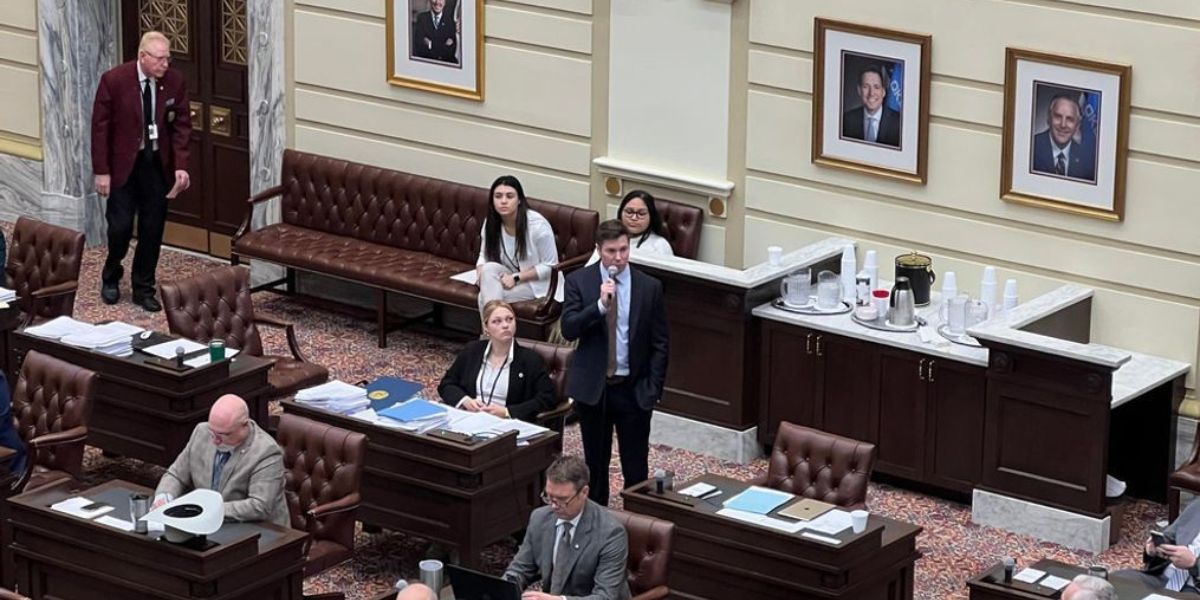In an effort to assist working families across the state, Oklahoma House Democratic Leader Cyndi Munson (D-OKC) has introduced a number of significant legislative initiatives this year.
Munson, who is well-known for standing up for the state’s working-class citizens, is giving top priority to policies that will have a direct impact on Oklahomans’ financial security, especially for those who are already facing mounting expenses and unstable economic conditions.
House Bill 2228, the first item of legislation, aims to increase the Sales Tax Relief Credit. If this law is approved, anyone who make up to $75,000 year will be eligible for a $200 tax credit.
The goal of the credit’s expansion is to help people who would not typically qualify for other tax benefits but are nevertheless struggling with rising living expenses.
According to Munson, this law represents a significant step toward easing some of the financial strains on Oklahoma’s middle-class and lower-income families, allowing them to keep a larger portion of their money for daily necessities.
Munson has also submitted House Bill 2229, which seeks to raise the state’s Earned Tax Credit (ETC) rebate, in addition to HB 2228. Low-income workers would greatly benefit from the idea, which would increase the refund from the current 5% to 10%.
“These bills improve the lives and decrease the financial burden of working Oklahoma families,” Leader Munson stated. “We can start by modernizing and expanding the Sales Tax Relief Credit, which has not been updated since 1990, and as we know, prices and cost of living have only gone up. Modifying this tax credit will provide targeted financial relief for Oklahomans who need it most. I also filed legislation to increase the Earned Income Tax Credit (EITC) refund from 5% to 10%. This is a better alternative to an income tax cut that primarily helps the wealthiest Oklahomans and takes revenue from core functions of government. The EITC has historically had bipartisan support because the credit has been effective for families and our economy.”
For people and families that are trying hard to make ends meet but are still having trouble paying for necessities, the Earned Tax Credit is an essential tool.
A higher refund rate would offer more financial assistance, possibly enabling many families to escape poverty or achieve financial stability. With a focus on making sure that workers receive fair and significant support, Munson’s plan responds to continuing conversations about the need for greater economic justice.
A plan that would increase the state minimum wage from the federal level of $7.25 per hour to $16 per hour is one of Munson’s most ambitious initiatives.
Growing worries about salary stagnation and rising living expenses have prompted this proposition. Munson contends that the existing minimum wage is insufficient for Oklahoman workers, many of whom find it difficult to pay for necessities, much less save for the future or make investments in healthcare and education.
In order to combat poverty and provide people the financial independence they require to flourish rather than merely survive, the proposed raise to $16 per hour is viewed as a crucial first step.
The law represents a drive to improve the quality of life for those at the bottom of the income distribution, even if it is anticipated to encounter strong opposition, particularly from business associations.
18-Month Prison Term for Former Ohio Dispatcher Who Started Multiple Forest Fires
Finally, House Bill 2231, which Munson submitted, would make it possible for all state employees to take advantage of the Child Care Subsidy Program.
This program helps working parents who require cheap daycare, however many state employees are currently not eligible. Munson’s bill would assist workers in juggling their work and family obligations by making it available to all state employees.
This would allow them to continue being involved and productive at work without having to worry about the expensive expense of childcare. For working parents, this bill is especially crucial, especially in a state like Oklahoma where there are few reasonably priced childcare options.
Thousands Hit with $5,000 Fines Over Tax Mistakes – Here’s What Not to Do
Munson is advocating for substantial reforms that put the welfare of working families in Oklahoma first through these legislative initiatives.
“State employees should be able to participate in a Child Care Subsidy Program similar to what we had during the COVID-19 pandemic,” Rep. Munson stated. “This will be a great incentive to retain our state employees as they navigate the Governor’s new Executive Order mandating they return to in-person work, which we know will have adverse effects on child care for employees.”








